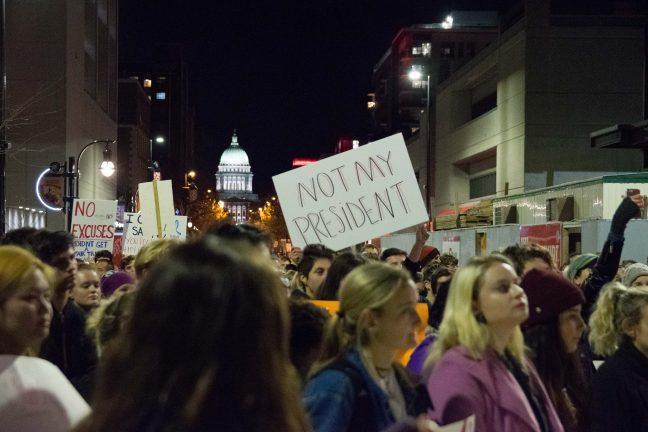I have a confession to make: Last night I escaped into my privilege. As I watched the results come in and it slowly dawned on me that Donald Trump would win the presidency, I sheltered myself in privilege.
As millions of Americans found themselves exposed with no means of escape, I plotted mine. I declared I would forego work this summer, an option available to me only because I’m blessed with parents who fully fund my college education. I stated I would take a full summer course load and graduate in December. I announced that I would parlay my artificially inflated GPA, due to me having the privilege to never have to work during the school year, into a job opportunity in a foreign country.
Enraged at strong support for Trump among rural voters, I spouted hateful rhetoric. I spewed vile sentiments about how I hoped they would lose the health care they received from the Affordable Care Act and that they would suffer from greater unemployment under under Trump. In the face of true adversity, I proved myself a coward.
But then I woke up on Nov. 9. After wallowing in self pity and tears for an hour in bed, I got up. As my day went along I realized that escaping into my privilege wouldn’t help me because my tears did not derive from fear for myself.
I have the bare modicum of self-awareness necessary to recognize that my privilege shelters me from the worst reverberations of this tragedy. I realized that I cried for my fellow Americans who lacked the privilege I take for granted everyday. My tears came from thoughts about the message Trump’s win sent to minorities, and how this election acts as a signal to some that racial discrimination is acceptable presidential behavior. My tears went out to the LGBTQ+, Jewish and Muslim communities who had received a clear message. A significant chunk of America does not want them here.
But maybe most surprisingly I realized my tears went out to the very poor, rural people who elected Trump in the first place.
A significant portion of their support for Trump came from a feeling of helplessness, partially in the face of demographic changes in this country. But this feeling also came from a feeling of isolation. As our cities become ever more connected, our rural areas begin to resemble different planets. These people truly do feel that politicians in Washington don’t care about them. They feel anger about the changing state of the U.S. economy, wistful for the old days of a manufacturing economy. Donald Trump channeled this anger, focusing it at the global trade deals that “stole their jobs” and at the career politicians who brokered these deals. Little do these people realize the manufacturing jobs they desperately wish to bring back have become a thing of the past.
Ultimately, a grain of truth exists in their sentiment — politicians have failed these people. Not because politicians agreed to trade deals that shipped manufacturing jobs overseas, but because they failed to allocate the surplus generated to things like education for these people. I cry for these rural voters because I believe that under a Donald Trump presidency they will suffer significantly more than they did under President Barack Obama.
But I also hope I am wrong. I refuse to place partisan sentiments over my desire for a better America.
I hope that Trump will prove an effective leader for America. I hope the economy blossoms under him and I pray he refrains from restricting the social liberties that have emerged over the past half century. I also hope that my fellow liberals will join me in this sentiment.
You don’t need to accept Trump’s policy positions and you certainly should protest any attempts to restrict social liberties, but you should hope that Trump will do good things for America. As Americans, we should always hope for the betterment of our country regardless of the president’s party affiliation.
This doesn’t mean that we should accept what Donald Trump stands for. It simply means hoping Trump proves you wrong by displaying effective leadership and social tolerance. We must rise above the negative sentiments spouted by Republicans in the aftermath of President Obama’s election.
I still have no sympathy for those Trump supporters whose vote came from a place of racial resentment, but I do pity the voters who supported him from a place of fear. Sadly the fear felt by these voters will now reverberate across our minority population. This election didn’t alleviate the fear that existed in this country — it merely redistributed it.
I realized today I don’t want to escape within my privilege and run away from these problems facing America, I want to help solve them. At this time I can’t say if I will try to help solve them by significantly increasing the amount of time I dedicate to volunteering, or by pursuing an entirely different career path. But I can say one thing for sure — I feel significantly more inclined to dedicating my life to fixing these problems today than I felt last week.
I’m also certain that I’m not the only one who feels this way. I have a feeling that, though this election may lead to a great deal of suffering in America, it will also provide the jolt that energizes the next wave of great American leaders. To echo the words of First Lady Michelle Obama, “When they go low, we go high.”
Connor Allen ([email protected]) is a junior majoring in history and economics.








